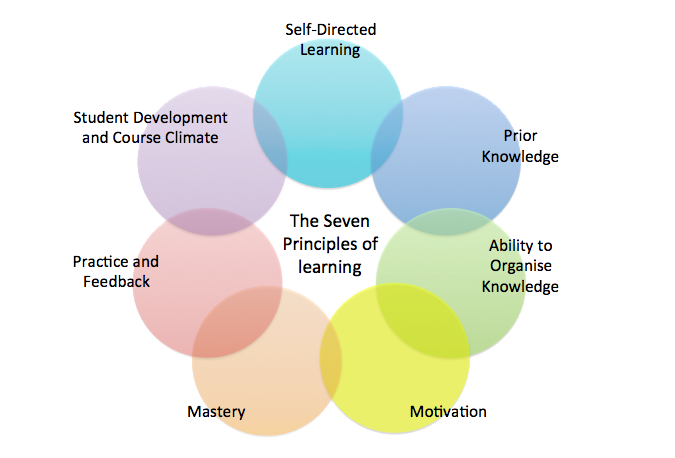Seven principles for Learning
Adapted from: Ambrose, S.A., Bridges, M.W., DiPietro, M., Lovett, M.C., & Norman, M.K. (2010). How learning works: Seven research-based principles for smart teaching. San Francisco: Jossey-Bass.
The seven principles for learning (Amrose et al, 2010) provides a useful framework for you on how to learn effectively. We hope you will find these principles useful as you reflect on your learning approach and experience in SMU. Each of the principles is summarised below:

1. Your prior knowledge can help or hinder learning.
Your knowledge, beliefs and attitudes influences how you perceive and interpret what you are learning. To effectively build new knowledge of the subject matter, activate your prior knowledge by relating new concepts or ideas to what you already know. However, when you do not have a firm grasp of basic principles or concepts or are unsure (i.e. your prior knowledge is insufficient for learning), that prior knowledge or understanding can interfere with or impede new learning.
LEARNING TIPS:
- Check out pre-requisites for the course so you know what prior knowledge is required.
- Review these pre-requisites.
- Assess your knowledge by practising questions.
- Ask your professor for supplementary reading materials.
2. How you organise knowledge influences how you learn and apply what you know.
You are better able to recall and apply knowledge effectively and efficiently when you make connections between pieces of knowledge, i.e. when you actively make connections to organize those relationships between various concepts or theories within the topic. For example, by asking and by finding out how concept A is related to concept B or how does concept C build upon concepts A & B.
LEARNING TIPS:
- Do note taking, draw mind maps or concept maps to help you visualize how you arrange and construct your knowledge.
3. Your motivation determines, directs, and sustains what you do to learn.
Motivation plays a critical role in guiding the direction, intensity, persistence, and quality of your learning behaviours in higher education because you are expected to be independent and self-directed learners. When you find positive value or meaning in a learning goal or activity, and you expect to successfully achieve a desired learning outcome with appropriate guidance from faculty, you are likely to be strongly motivated to learn.
LEARNING TIPS:
- Being in SMU is a great achievement, a testimonial of your perseverance and motivation to take a scholarly road to learn.
- Set achievable and realistic targets and move towards it.
4. To develop mastery, you must acquire component skills, practice integrating them, and know when to apply what you have learned.
In order to master the knowledge and skills necessary for you to perform complex tasks, you must learn when and how to apply the skills and knowledge you learn, and also practise combining and integrating them on a regular basis to develop greater skillfulness.
LEARNING TIPS:
- Participate in class discussion, ask questions to clarify your doubts, listen to your peers and instructors and response to queries, ideas in the classroom.
- Take charge of your learning journey.
- Look beyond “textbook” materials and set goals “I want to apply/relate/test/critique this theory to this issue “.
- Most professors would give materials beyond the text book and demonstrate how they too apply concepts to real world issues.
- Practise these skills during class discussions, in your project work, writing assignment, examinations.
5. Goal-directed practice coupled with targeted feedback enhances the quality of your learning.
Learning is best faciliated when you seek quality feedback at appropriate times that focuses on specific learning goals. Effective feedback explicitly communicates important aspects of your performance and provides useful information to help you progress in meeting the performance criteria.
LEARNING TIPS:
- Ask for your professor’s feedback on assignments such that you are clear about what is needed to help you progress in your learning.
6. Your current level of development interacts with the social, emotional, and intellectual climate of the course to impact learning.
To be an effective learner, you have to develop not only intellectual skills but also social and emotional skills. A positive classroom environment (with supportive faculty and classmates) can energise your learning.
LEARNING TIPS:
- This is a gentle reminder for both professors and students to set a course climate where there is respect, concern and fairness which will encourage you and your classmates to think freely, explore and question your assumptions and doubts.
- In reciprocity, professors would also expect their students to create a climate of respect, concern and fairness for their peers.
7. To become self-directed learners, you must learn to monitor and adjust your approaches to learning.
To develop lifelong learning skills, you should reflect upon your learning regularly to monitor and control your learning, i.e. by assessing the task at hand, evaluating your own strengths and weaknesses, planning your approach, applying and monitoring various strategies, and reflecting on the degree to which your current approach is working or is not working. This will help you to improve your current performance as well as being an effective lifelong learner.
LEARNING TIPS:
- Be aware and practice the above (assess / evaluate / plan / apply and monitor / reflect) in any of the courses you take in SMU.
- Ask yourself these questions:
- Why am I here, enrolled in this course?
- If this is a compulsory course, what do I want to take away from this course?
- What did you learn from doing the project?
- What skills do you need to work on? How would you prepare differently for the course based on the feedback given across the semester?
- What type of learner am I?
- What type of learner do I want to be?